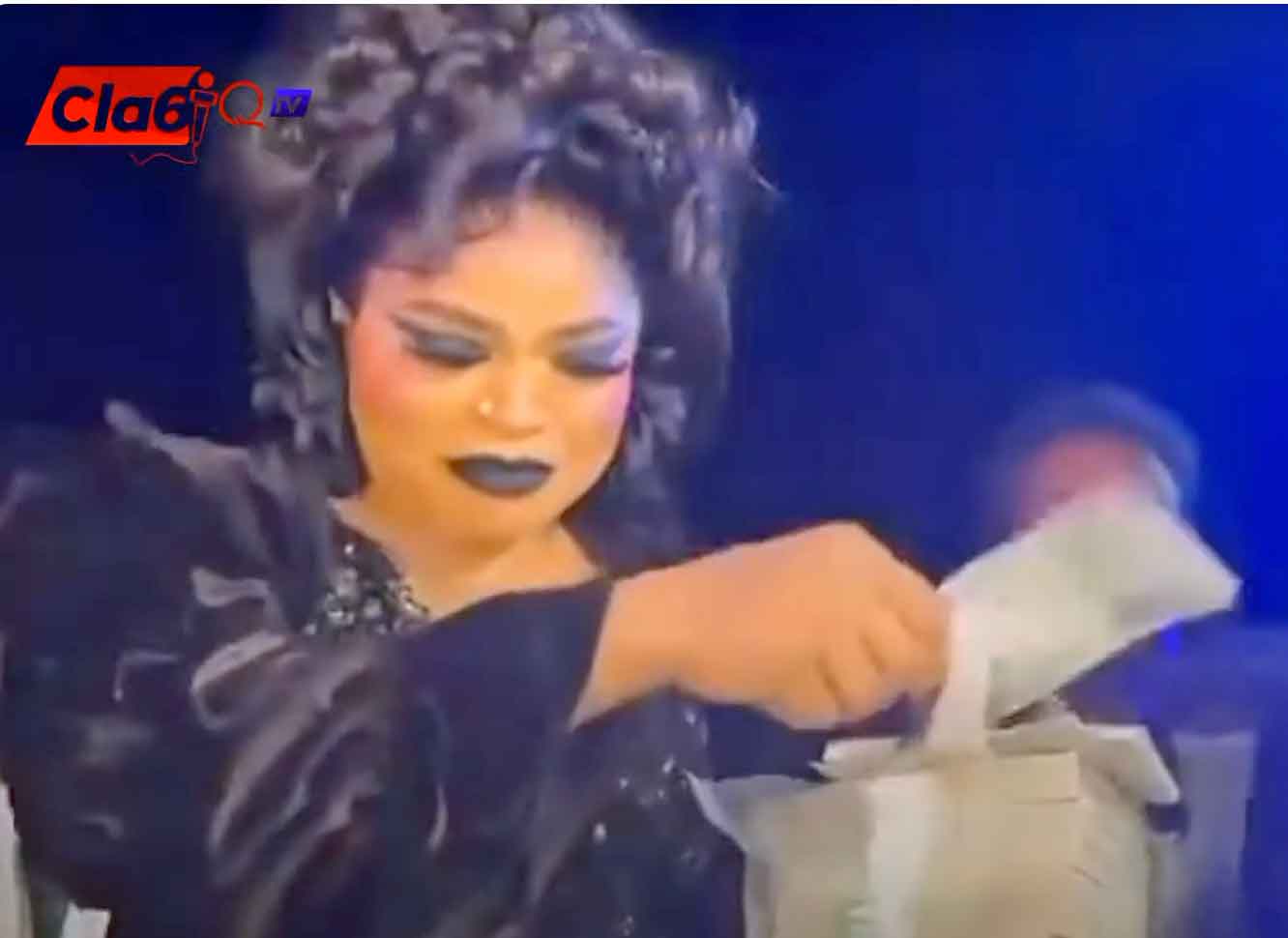
Bobrisky in court on April 5, when she pleaded guilty to abusing Nigerian currency. (Photo courtesy of ChannelTV)
Internet celebrity Idris Okuneye, a Nigerian trans woman known online as Bobrisky, has appealed a six-month prison sentence for “spraying” money in the air during a film premiere.
Such spraying is a traditional part of Nigerian celebrations.
The act of spraying money remains a revered part of Nigerian celebrations, Funmi Feyide John wrote in AfroStyle magazine. “Anyone that has been to a Nigerian wedding, for instance, has either witnessed, or if bold enough to make it to the dance floor, been the subject of spraying. Nigerians spray dancers or special individuals with money during celebrations, delicately placing each individual note on the head of the subject. A bride, for instance, can be overwhelmed by the amount of bills placed on her head while dancing away at her wedding.”
Bobrisky‘s lawyer appealed to the court to replace the prison sentence with a ₦50,000 fine (about U.S. $37) for each of four charges, Ghana Web reported.

Nigerian money spraying (Photo courtesy of Cla6iQ TV)
This comes after he faced charges of ‘four counts of naira abuse’ after she was arrested by the EFCC.
Bobrisky had pleaded guilty before Justice A.O. Awogboro of the Federal High Court in Lagos before being sentenced to six months in jail without the option of a fine.
Bobrisky said in court that she was not aware of the law, ABC News reported. “I am a social media influencer with 5 million followers … I wish I can be given a second chance to use my platform to educate my followers against the abuse of the naira,” she told the judge.
The judge, while pronouncing his ruling, said the sentence was meant to serve as a deterrent to citizens who are fond of defacing the naira by spraying it at events.
Bobrisky’s attorney, Bimbo Kusanu, said that the trial court had imposed the harshest possible sentence even though Bobrisky had no prior criminal convictions.
In making the arrest, Nigeria’s Economic and Financial Crimes Commission (EFCC) alleged that Bobrisky flaunted N50,000 (roughly $36) during a social event last summer and N400,000 ($306) at another gathering in March.
EFCC said it had based its probe on a “video of spraying and flaunting wads of new naira notes” at a film premiere in Lago, AFP reported.
Nigerian actress Oluwadarasimi Omoseyin was sentenced to six months in prison in February after she was filmed spraying and stepping on banknotes.

Bobrisky
Activist Felix Abayomi said the EFCC was using Bobrisky as a scapegoat due to the fact that she is a vulnerable member of the society, AFP reported.
“Discrimination in the name of implementing a pick and choose law! Why go after someone that is a vulnerable member of our society? Someone that is clearly dealing and coping with stigmatization of her lifestyle choices which is innate. Using her as a scapegoat is uncalled for,” said Abayomi. “How does spraying the naira that is cultural to us as a people ever even become a financial crime? People who commit economic and financial crimes against us as a people and against our nation state are sitting comfortably in the hollows of our legislative chambers and power.”
Chidi Odinkalu, the former chair of the National Human Rights Commission, said the arrest was not about the mutilation of the naira notes, but about Bobrisky’s gender identity.
“The EFCC should be ashamed of themselves,” said Odinkalu. “The power of arrest and prosecution is a public trust that should not be weaponized for the persecution of those whom they don’t like. It is either the EFCC is evidently idle or this is a clear abuse of power.”
EFCC spokesperson Dele Oyewale said Odinkalu’s statements were reckless.
“The commission views such commentaries from Odinkalu as unbecoming of a former head of a major government agency,” said Oyewale. “Okuneye was arrested and arraigned by the commission on the basis of clear cases of abuse of the naira to which he has pleaded guilty.”
AFP stated that Bobrisky is one of the few individuals on the African continent who have publicly discussed their gender transition. .
Ever since she started to publicly show her transition, several Nigerian political pundits have been calling for her arrest, AFP said. There are no laws that specifically target Trans Nigerians, but the Same-Sex Marriage Act criminalizes same-sex marriages and prohibits the public display of same-sex relationships with up to 14 years in prison.
Source: African Human Rights Media Network member Erasing 76 Crimes
COMMENTS